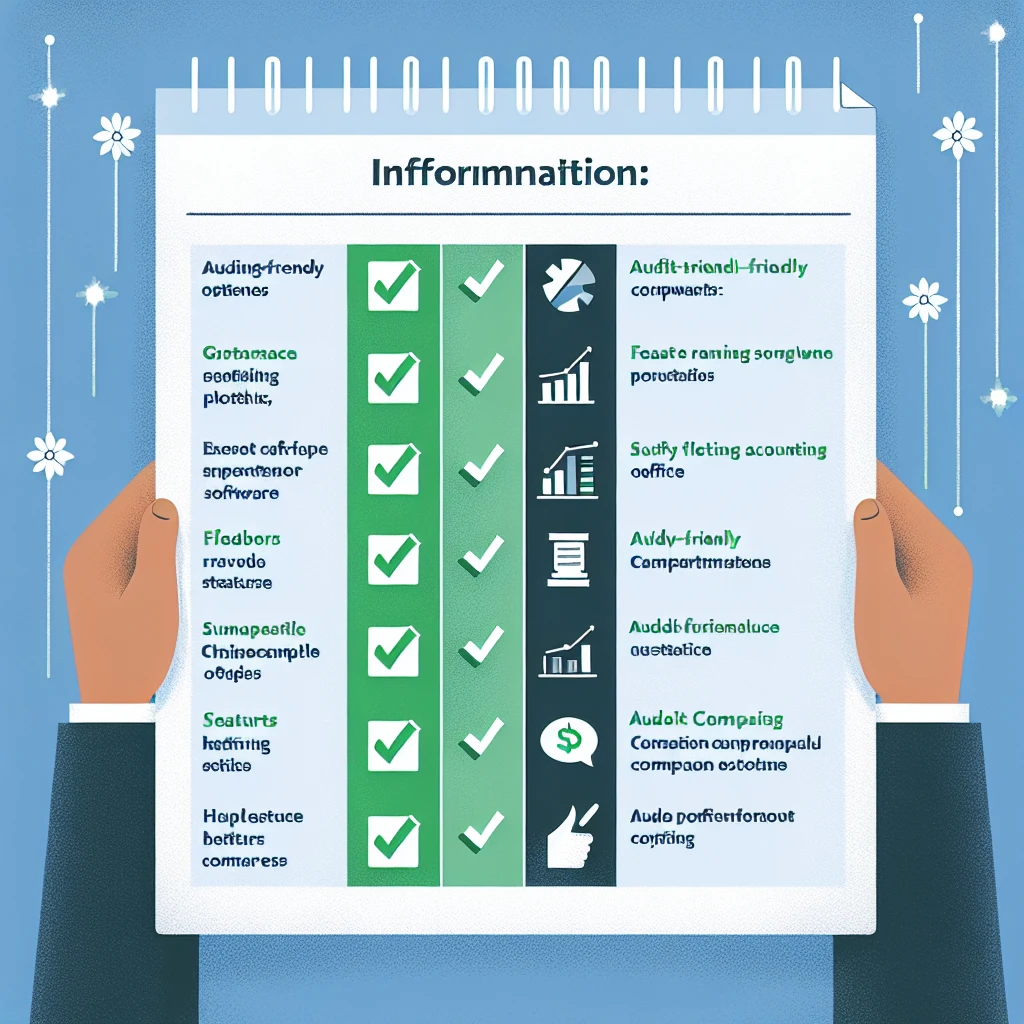Choosing the Right Accounting Software
When it comes to ecommerce audits, the bedrock of efficiency lies in the accounting software you choose. It's not just about tracking every penny; it's about finding a system that speaks the language of your business and prepares you for the scrutiny of an audit. Let's dive deep into the criteria that can make or break your decision.
- Integration Capabilities: Your ecommerce platform and accounting software should be in a harmonious relationship. Look for software that seamlessly integrates with your sales channels, inventory management, and payment processors. This connectivity reduces manual entry errors and ensures real-time data accuracy, which is crucial for inventory audits and financial reporting.
- Compliance Features: Tax laws are as stable as a house of cards in a windstorm. Opt for software that stays updated with the latest tax regulations and can handle multi-state and international sales tax complexities. This foresight can be a lifesaver during tax compliance audits.
- Scalability: Your business will grow, and so should your accounting software. A system that can scale with your business without skipping a beat is non-negotiable. You don't want to switch platforms during a growth spurt.
- Reporting and Analytics: The ability to generate comprehensive reports and analytics is a must. Insightful reporting aids in identifying trends, anomalies, and areas of risk before they become issues in an audit.
- User Experience: If using the software feels like deciphering an ancient script, it's not the right fit. A user-friendly interface that doesn't require a degree in rocket science to navigate will ensure that your team can use it effectively, reducing the likelihood of errors.
Remember, the right accounting software doesn't just record transactions; it empowers your ecommerce business to be audit-ready at all times, turning what could be an arduous process into a streamlined, confident stride towards business transparency and accountability.

Automated Reporting and Data Analytics
Stepping beyond the foundational choice of accounting software, let's explore the dynamic duo of automated reporting and data analytics in the context of ecommerce audits. The integration of these technologies can be a game-changer, transforming the daunting task of audit preparation into a smooth, systematic process. Here's how:
- Time Efficiency: Automated reporting tools are like having a tireless assistant working around the clock. They compile data from various sources, apply consistent criteria, and generate reports at the click of a button. This means you can bid farewell to the days of manual data crunching and welcome a streamlined approach that frees up your team to focus on more strategic tasks.
- Accuracy and Consistency: Human error is an inevitable part of manual processes. Automation, on the other hand, follows a set of predefined rules, ensuring that the output is consistent and accurate. This reliability is paramount when you're preparing for an audit, where every figure and transaction is under scrutiny.
- Real-time Insights: With automated analytics, you're not just looking at historical data; you're getting a live feed of your business's financial health. This allows for proactive decision-making and the ability to spot and address discrepancies promptly, well before the auditors come knocking.
- Comprehensive Data Analysis: Today's tools don't just report; they analyze. They can highlight trends, predict future outcomes, and even suggest areas of improvement. This level of insight is invaluable for maintaining audit-readiness and overall business performance.
Consider tools like QuickBooks Online for automated reporting or Tableau for advanced data analytics. These platforms can significantly reduce the time and effort required to prepare for audits, while also enhancing the quality of your financial data.
For instance, integrating QuickBooks Online with your ecommerce platform can automate the generation of profit and loss statements, balance sheets, and cash flow statements. Meanwhile, Tableau can take this data and visualize it in a way that makes complex information easily digestible, revealing patterns that might go unnoticed in traditional spreadsheets.
By harnessing the power of automated reporting and data analytics, ecommerce businesses can not only simplify audit preparation but also gain deeper insights into their operations, leading to more informed decision-making and a robust bottom line. For a deeper dive into audit preparedness, consider reading The Ultimate Guide to Ecommerce Audit Preparedness.
Integrating Ecommerce Platforms with Accounting Tools
Now, let's delve into the nitty-gritty of integrating your ecommerce platform with accounting tools, a critical step to ensure seamless data flow and accurate financial reporting. This integration is more than just a technical handshake between systems; it's about crafting a streamlined information highway that allows data to travel back and forth without roadblocks. Here are some best practices to consider:
- Choose Compatible Systems: Begin by ensuring your ecommerce platform and accounting tool can communicate effectively. Look for compatibility or the availability of APIs that facilitate smooth data exchange. This will save you from the headache of manual data entry and the errors that come with it.
- Automate Data Syncing: Real-time data syncing is the backbone of accurate financial reporting. Set up your systems to automatically import sales, expenses, customer data, and inventory levels. This ensures that your financial statements are always up-to-date, providing a true reflection of your business's financial health.
- Map Data Fields Accurately: When setting up the integration, pay close attention to how data fields are mapped between systems. Incorrect mapping can lead to misreported figures, which can be disastrous during an audit. Take the time to ensure that each field aligns perfectly with its counterpart.
- Regular Reconciliation: Regularly reconcile your ecommerce transactions with your accounting records. This not only prepares you for audits but also helps in catching discrepancies early, which could be indicative of deeper issues like fraud or mismanagement.
- Utilize Cloud-Based Solutions: Cloud-based accounting tools offer the advantage of accessibility and security. They allow you and your auditors to access financial data from anywhere, at any time, which is essential for efficient audit processes.
- Train Your Team: Ensure that your team is well-versed in both the ecommerce and accounting platforms. Adequate training will minimize errors and empower your team to handle the systems effectively.
Integrating your ecommerce platform with robust accounting tools like Xero or QuickBooks can transform your financial management and audit preparation. For instance, Xero's integration with ecommerce platforms allows for automatic tracking of sales and inventory, making it easier to monitor business performance and prepare for audits. To enhance your understanding of the role of internal controls in ecommerce audits, consider exploring Understanding the Role of Internal Controls in Ecommerce Audits.
Remember, the goal of integrating these systems is to create a cohesive ecosystem where data flows freely, errors are minimized, and financial reporting is as accurate as possible. With these best practices in place, you'll be well on your way to a seamless audit experience and, ultimately, a more financially sound ecommerce business.







